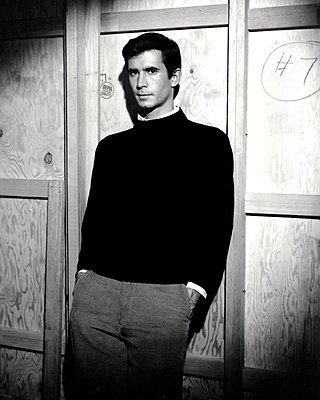
Norman Bates is a fictional character created by American author Robert Bloch as the main antagonist in his 1959 horror novel Psycho. He has an alter, Mother, who takes from the form of his abusive mother, and later victim, Norma, who in his daily life runs the Bates Motel.

The Thin Man Goes Home is a 1945 American comedy mystery film directed by Richard Thorpe. It is the fifth of the six Thin Man films starring William Powell and Myrna Loy as Dashiell Hammett's dapper ex-private detective Nick Charles and his wife Nora. The supporting cast includes Lucile Watson, Gloria DeHaven and Helen Vinson. This entry in The Thin Man series was the first not directed by W.S. Van Dyke, who had died in 1943.

And Then There Were None is a 1974 mystery film and an adaptation of Agatha Christie's best-selling 1939 mystery novel of the same name. The film was directed by Peter Collinson and produced by Harry Alan Towers. This was the second of three versions of Christie's novel to be adapted to the screen by producer Harry Alan Towers. Two film adaptations were previously released. An American made-for-television version was broadcast in 1959. Towers produced a third version in 1989.

They Only Kill Their Masters is a 1972 American mystery film directed by James Goldstone, written by Lane Slate, and starring James Garner and Katharine Ross, with a supporting cast featuring Hal Holbrook, June Allyson, Tom Ewell, Peter Lawford, Edmond O'Brien, and Arthur O'Connell. The title refers to Doberman dogs that might have been responsible for a woman's murder currently under investigation by the local police chief (Garner).
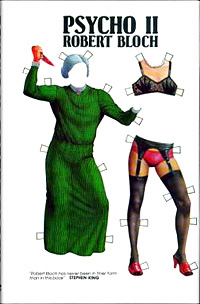
Psycho II is a 1982 novel by American writer Robert Bloch, a sequel to his 1959 novel Psycho. The novel was completed before the screenplay was written for the unrelated 1983 film Psycho II. According to Bloch, Universal Studios loathed the novel, which was intended to critique Hollywood splatter films. A different story was created for the film and Bloch was not invited to any screenings. Universal suggested that Bloch abandon his novel, which he declined and released anyway to good sales.
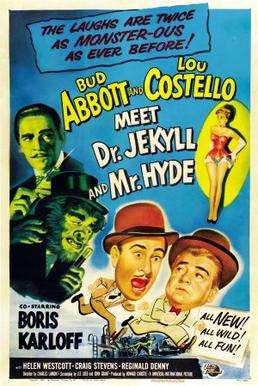
Abbott and Costello Meet Dr. Jekyll and Mr. Hyde is a 1953 American horror comedy film starring the comedy team of Abbott and Costello, co-starring Boris Karloff, and directed by Charles Lamont.
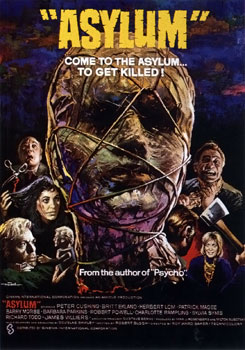
Asylum is a 1972 British anthology horror film made by Amicus Productions. The film was directed by Roy Ward Baker and produced by Milton Subotsky. Robert Bloch wrote the script, adapting four of his own short stories.
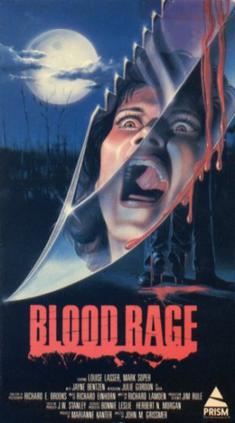
Blood Rage is a 1987 American slasher film directed by John Grissmer, written by Bruce Rubin, and starring Louise Lasser, Mark Soper, and Julie Gordon. Set on Thanksgiving, the film follows a woman and her adult son who are stalked at their remote apartment community by the son's unhinged twin brother who has escaped from a psychiatric institution after allegedly murdering a man years earlier.

Norma Bates is a fictional character created by American author Robert Bloch in his 1959 thriller novel Psycho. She is the deceased mother and victim of serial killer Norman Bates, who had recreated her in his mind as a murderous alternate personality.
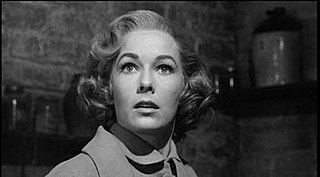
Lila Loomis is a fictional character created by American author Robert Bloch in his 1959 thriller novel Psycho; she is the sister of Norman Bates's victim Marion Crane. She is revealed as the real protagonist of the novel in the final chapters, after several false protagonists, including her sister, get murdered. Lila is portrayed by Vera Miles in the 1960 film version and by Julianne Moore in the 1998 version. Additionally, Lila appears in Bloch's 1982 sequel novel Psycho II, and the unrelated 1983 sequel film of the same name, in which she serves as an antagonist.

Satan's School for Girls is a 1973 American made-for-television horror film directed by David Lowell Rich, and produced by Aaron Spelling. The film has been named as one of the most memorable television movies of the 1970s.

The Affairs of Jimmy Valentine is a 1942 American comedy crime film directed by Bernard Vorhaus and starring Dennis O'Keefe, Ruth Terry, and Gloria Dickson.

Clinical is a 2017 American horror thriller film directed by Alistair Legrand and written by Luke Harvis and Alistair Legrand. The film stars Vinessa Shaw, Kevin Rahm, India Eisley, Aaron Stanford, Nestor Serrano, Sydney Tamiia Poitier, and Wilmer Calderon. The film was released on Netflix on January 13, 2017.
"Payback" is the thirteenth episode of the second season of the American television police sitcom series Brooklyn Nine-Nine. It is the 35th overall episode of the series and is written by Norm Hiscock & Brigitte Munoz-Liebowitz and directed by Victor Nelli Jr. It aired on Fox in the United States on January 11, 2015.
"Terry Kitties" is the nineteenth episode of the third season of the American television police sitcom series Brooklyn Nine-Nine. It is the 64th overall episode of the series and is written by Phil Augusta Jackson & Tricia McAlpin and directed by Michael McDonald. It aired on Fox in the United States on March 15, 2016.
"The Fugitive" is the eleventh and twelfth episodes of the fourth season of the American television police sitcom series Brooklyn Nine-Nine. It is the 79th and 80th overall episodes of the series. "Part 1" is written by Carol Kolb and directed by Rebecca Asher while "Part 2" is written by Justin Noble & Jessica Polonsky and directed by Ryan Case. It aired on Fox in the United States on January 1, 2017.

Wolves at the Door is a 2016 American horror film directed by John R. Leonetti and written by Gary Dauberman. The film is loosely based on the murder of Sharon Tate, the wife of Roman Polanski, and her friends in 1969 by members of the Manson Family. The cast features Katie Cassidy, Elizabeth Henstridge, Adam Campbell and Miles Fisher as four friends who are stalked and murdered by a group of intruders at a farewell party.
Three Dangerous Ladies is a 1977 British-Canadian horror anthology film composed of three episodes of the six-part Harlech Television and The Ontario Educational Communications Authority co-produced series of half-hour television films titled Classics Dark and Dangerous. The three segments, Mrs. Amworth, The Mannikin and The Island, were directed, respectively, by Alvin Rakoff, Don Thompson, and Robert Fuest. The cast includes Glynis Johns, John Phillips, Ronee Blakley, Keir Dullea, John Hurt and Charles Gray.

Murderville is an American comedic murder-mystery television series with improvised elements developed by Krister Johnson for Netflix. The series is based on the BBC Three television series Murder in Successville. Murderville premiered on February 3, 2022 with the release of all six episodes of the first season.















